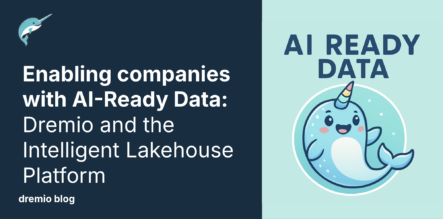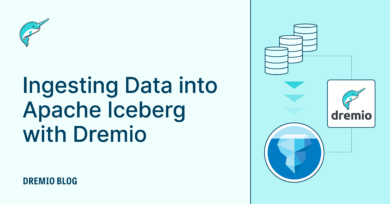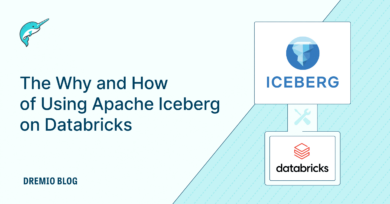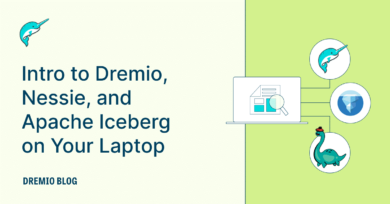12 minute read · April 21, 2025
Enabling companies with AI-Ready Data: Dremio and the Intelligent Lakehouse Platform
· Principal Product Marketing Manager

Artificial Intelligence (AI) has become essential for modern enterprises, driving innovation across industries by transforming data into actionable insights. However, AI's success depends heavily on having consistent, high-quality data readily available for experimentation and model development. It is estimated that data scientists spend 80+% of their time on data acquisition and preparation, compared to model building and deployment. This is where Dremio’s Intelligent Lakehouse Platform comes into play, streamlining the process and allowing data scientists to spend more time on the high-value tasks of building models and analyzing data vs. acquiring and preparing data. Dremio provides a seamless platform for AI teams to access, prepare, and manage data efficiently, accelerating time to AI insight.
Through a collaborative lakehouse model built on open standards like Apache Iceberg, Dremio equips enterprises with AI-ready data, ensuring smooth data collection, aggregation, description, wrangling, and discovery for AI initiatives. The flexibility of the Dremio Intelligent Lakehouse Platform offers AI teams the ability to operate across cloud and on-premises infrastructures, helping them to optimize AI workflows and future-proof their infrastructure.
AI's Data Challenge: The Need for Readiness
AI teams face several challenges when preparing data for AI and machine learning (ML) models. Unlike traditional analytics projects, AI workflows involve large-scale datasets, complex preprocessing, and frequent experimentation. Many organizations struggle with:
- Scattered data sources across cloud and on-premises environments.
- Data silos that hinder collaboration between data scientists, engineers, and analysts.
- Time-consuming ETL processes required to collect and prepare datasets.
- Complex data environments that slow down experimentation and model testing.
Traditional data management platforms often fail to meet these challenges. AI teams require a platform that supports fast access to real-time data, scalability, governance, and the ability to experiment rapidly without creating excessive data movement. The Dremio Intelligent Lakehouse Platform excels in this area by delivering a data environment optimized for AI data prep workloads.
The Intelligent Lakehouse Platform Advantage -Delivering AI-Ready Data Products
At the core of Dremio’s value for AI is its ability to create AI-ready data products—reusable, governed, and performance-optimized datasets that serve as trusted inputs for AI and ML models. These data products unify access to distributed data sources through a semantic layer that abstracts complexity and provides business-friendly views of data. Whether sourced from data lakes, catalogs, relational databases, or cloud warehouses, these virtualized products eliminate the need for data duplication or pipelines. The Dremio Intelligent Lakehouse Platform helps companies prepare AI-ready data and streamline the AI pipeline process.
1. Semantic Search for Rapid Data Discovery
One of the biggest hurdles AI teams face is finding the relevant data quickly and confidently. Traditional data catalogs can be difficult to navigate and require technical knowledge, slowing down the experimentation process. Dremio addresses this challenge with AI-Enabled Semantic Search, which transforms how users discover and access data across the organization.
With semantic search, users can locate datasets using search criteria, making it easy for data scientists, analysts, and business users to find relevant existing data to create data products. This eliminates bottlenecks in the data discovery phase and accelerates time to insight.
Semantic search is fully integrated into Dremio’s Enterprise Lakehouse Platform, enabling users to search across all objects registered with Dremio, including views, physical tables, metadata tags, and descriptions—all within a governed environment. This intuitive experience helps AI teams move faster from exploration to model development while reducing dependency on data engineers. Dremio’s semantic search removes friction from the AI development process and fosters greater collaboration across teams.
2. Data Collection and Aggregation
The second step in any AI project is gathering data from various sources, including cloud-based storage, on-premises systems, databases, and other data sources. This process can be challenging for AI teams due to the volume and diversity of the data involved. Dremio simplifies data collection and aggregation by:
- Querying data directly on data lakes without needing to move it into proprietary warehouses.
- Supporting open formats like Apache Iceberg and Apache Parquet, ensuring easy access across environments.
- Integrating seamlessly with a company's existing infrastructure, enabling data to be accessed wherever it resides.
By eliminating the need for the dependency on complex ETL processes, AI teams can rapidly access large datasets. This can be done both physically or virtually through the creation of views. This allows data scientists to begin accessing and working on data without delays, reducing the time it takes to get from raw data to insights.
3. Data Description and Tagging
Once data is collected, the next step is description and tagging, a crucial process for AI teams to ensure datasets are labeled and categorized accurately for training models. Dremio offers robust metadata management capabilities to simplify this step. Using Dremio's semantic layer and data catalog, teams can:
- Assign business and technical metadata to datasets, improving discoverability and usability.
- Tag data for specific AI projects, ensuring the right data is used for model training.
- Utilize features within the catalog to enforce data governance standards and maintain consistency across projects.
This semantic layer ensures that everyone in the organization—from data scientists to business users—can easily find and understand relevant datasets. Accurate data description and tagging are essential for building trustworthy models and ensuring AI projects align with business objectives.
4. Data Wrangling and Preparation
Data wrangling—the process of cleaning and transforming raw data into usable formats—is one of the most time-consuming tasks for AI teams. Dremio's self-service platform empowers data scientists and engineers to perform complex wrangling tasks efficiently, without depending heavily on IT teams. Key features include:
- Allowing users to generate sql queries using natural language prompts.
- The ability to query data in place, avoiding unnecessary data movement and reducing latency.
- Support for collaborative data views that can be built, shared, and reused across different teams.
The Dremio platform reduces preparation time by simplifying data wrangling, enabling AI teams to spend more time on model experimentation and less time on data cleaning. Additionally, the ability to analyze data in real time ensures that AI models are always trained on the latest, most accurate datasets.
5. Autonomous Performance Acceleration
Creating high-performing data products for AI typically requires data engineers to build physical materializations or optimize pipelines manually—a process that slows down experimentation and increases operational overhead. Dremio eliminates this burden through Autonomous Reflections, a breakthrough capability that brings intelligent, hands-off query acceleration to AI workloads.
Autonomous Reflections automatically detect frequent query patterns and create optimized materializations under the hood, acting as a persistent, always-fresh cache. Unlike traditional approaches that require manual intervention or complex configuration, Autonomous Reflections dynamically adapt to changing query behavior—ensuring fast performance even as datasets evolve or data products are reused across teams.
This innovation has a profound impact on virtual data product creation. With Dremio, most data products can be built as logical views, removing the need to create or maintain physical copies just to meet a specific performance profile. Teams can rapidly generate and iterate on data products without worrying about performance tuning—Dremio takes care of that automatically.
6. Seamless Governance and Security for AI initiatives
Governance and security are critical components of any AI initiative, particularly in hybrid environments where data spans multiple locations. The Dremio Intelligent Lakehouse Platform ensures robust governance while maintaining flexibility, thanks to:
- Role-based access control (RBAC): Ensuring only authorized users can access specific datasets.
- Fine-grained permissions: Controlling access down to the column and row level to protect sensitive information.
- Unified governance: Providing visibility across both on-premises and cloud environments to maintain compliance with industry standards.
With these governance features, AI teams can confidently experiment and develop models while ensuring data privacy, security, and regulatory compliance.
7. Flexibility Across On-Premises and Cloud Environments
The hybrid nature of the Dremio’s Intelligent lakehouse solution allows enterprises to operate across both on-premises and cloud environments. This flexibility is especially beneficial for AI teams that require access to large datasets stored across multiple locations. By leveraging Dremio’s Intelligent Lakehouse Platform companies can:
- Optimize workloads by allowing organizations to process on-premises data on-premises and not having to move it to the cloud.
- Provide high performance across all environments with Dremio Reflection’s intelligent query acceleration.
- Avoid vendor lock-in by using a lakehouse built on open standards like Apache Parquet and Apache Iceberg.
This open and flexible hybrid approach not only reduces infrastructure costs but also ensures seamless data access, giving AI teams the freedom to work wherever they need to.
Empowering Companies with AI-Ready Data
The Dremio Intelligent Lakehouse Platform is a game-changer for organizations looking to accelerate AI initiatives with AI-ready data. From data collection and aggregation to description, tagging, wrangling, and model testing, the platform streamlines the AI workflow.
By eliminating ETL bottlenecks, creating sharable, reusable data products, supporting real-time analytics, and enabling intelligent acceleration, Dremio empowers AI teams to focus on what matters most—building innovative models and generating insights. The open architecture based on Apache Iceberg ensures flexibility and vendor independence, while the hybrid infrastructure offers the best of both cloud and on-premises environments.
For enterprises seeking to unlock the full potential of AI, Dremio provides the tools needed to deliver AI-ready data, enabling faster, more efficient AI development while ensuring governance, security, and compliance. With this powerful lakehouse solution, companies can future-proof their infrastructure and stay ahead in the rapidly evolving world of AI.
Sign up for AI Ready Data content


